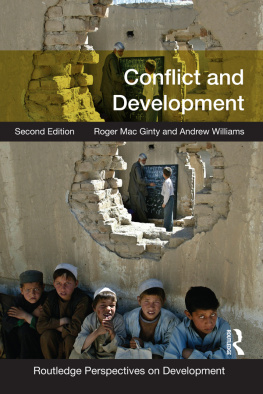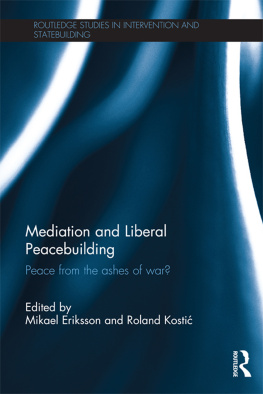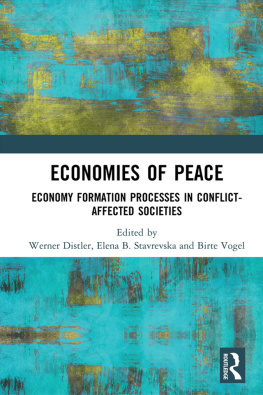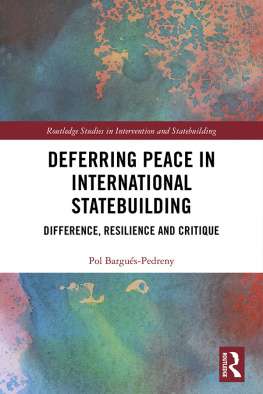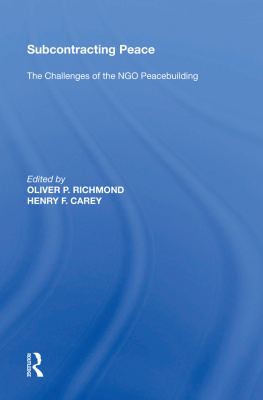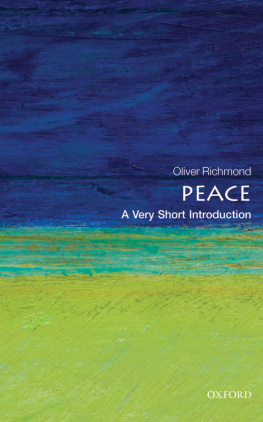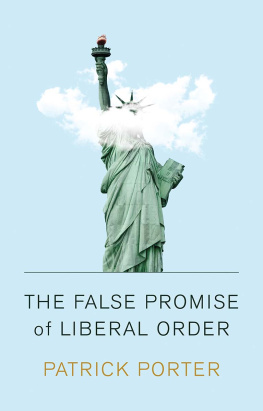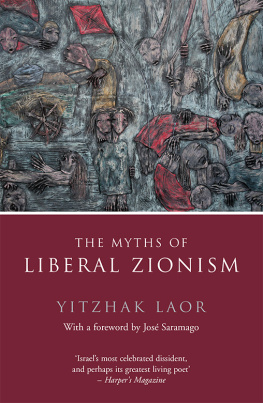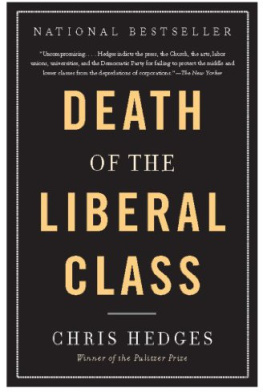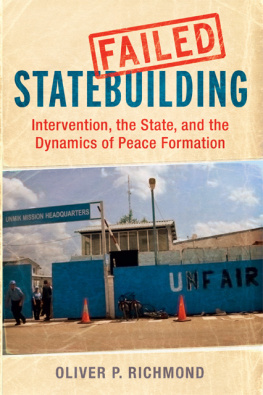The Liberal Peace and Post-War Reconstruction
The post-Cold War era has witnessed enormous levels of western peacekeeping, peacemaking and reconstruction intervention in societies emerging from war. These western-led interventions are often called liberal peace-building or liberal interventionism, or state-building, and have attracted considerable controversy.
In this study, leading proponents and critics of the liberal peace and contemporary post-war reconstruction assess the role of the United States, European Union and other actors in the promotion of the liberal peace, and of peace more generally. Key issues, including transitional justice and the acceptance/rejection of the liberal peace in African states are also considered.
The failings of the liberal peace (most notably in Iraq and Afghanistan, but also in other locations) have prompted a growing body of critical literature on the motivations, mechanics and consequences of the liberal peace. This volume brings together key protagonists from both sides of the debate to produce a cutting edge, state of the art discussion of one the main trends in contemporary international relations.
This book was originally published as a special issue of Global Society.
Roger Mac Ginty is a Reader at the School of International Relations, University of St. Andrews. He specialises in the study of conflict, political violence and conflict transformation. His last monograph was No War, No Peace: The rejuvenation of stalled peace processes and peace accord (Palgrave 2006).
Oliver Richmond is a Professor at the School of International Relations, University of St. Andrews, where he also directs the Centre for Peace and Conflict Studies. He focuses on the question of peace in IR and the study of conflict. His most recent publications were Peace in IR (Routledge, 2008) and The Transformation of Peace (Palgrave 2005).
The Liberal Peace and Post-War Reconstruction
Myth or reality?
Edited by Roger Mac Ginty and
Oliver Richmond
First published 2009 by Routledge
2 Park Square, Milton Park, Abingdon, Oxon, OX14 4RN
Simultaneously published in the USA and Canada
by Routledge
270 Madison Avenue, New York, NY 10016
Routledge is an imprint of the Taylor & Francis Group, an informa business
2009 Edited by Roger Mac Ginty and Oliver Richmond
Typeset in Palatino by Value Chain, India
Printed and bound in Great Britain by MPG Books Ltd., Bodmin, Cornwall
All rights reserved. No part of this book may be reprinted or reproduced or utilised in any form or by any electronic, mechanical, or other means, now known or hereafter invented, including photocopying and recording, or in any information storage or retrieval system, without permission in writing from the publishers.
British Library Cataloguing in Publication Data
A catalogue record for this book is available from the British Library
ISBN10: 0-415-48926-1
ISBN13: 978-0-415-48926-3
Contents
Introduction
Myth or Reality: Opposing Views on the Liberal Peace and Post-war Reconstruction
Roger Mac Ginty and Oliver Richmond
Adam Quinn and Michael Cox
Tim Jacoby
Andrew Williams
Ian Taylor
Timothy M. Shaw and Pamela K. Mbabazi
Chandra Lekha Sriram
David Chandler
Keith Webb, who died in March 2008, spent much of his academic life pursuing a wide range of interests, but that closest to his heart was conflict research. A true scholar, he contributed to the literature and involved himself in facilitation exercises notably in South Africa, Moldova and Cyprus. But above all he was a magnificent teacher whose influence will be felt through his students for decades to come. I join the authors of this volume drawn from Global Society in paying tribute to the scholar, teacher and friend whom we have lost.
A.J.R.Groom
Editor, Global Society
David Chandler is Professor of International Relations, Centre for the Study of Democracy, University of Westminster. His most recent books include Empire in Denial: The Politics of State-building (2006); From Kosovo to Kabul and Beyond (new edn, 2006); (editor) Peace without Politics? Ten Years of International State-building in Bosnia (2006); and Constructing Global Civil Society: Morality and Power in International Relations (2005).
Michael Cox taught in the Department of International Politics in Aberystwyth before moving to the Department of International Relations at the LSE in 2003 where he is a Professor and also Director of the Centre for Cold War Studies. He was elected Chair of the European Consortium for Political Research (ECPR) in 2006 and will be Senior Fellow at the Nobel Institute in Oslo in 2007. His recent publications include American Democracy Promotion (reissued in Japanese translation, 2006) and Farewell to Arms: Beyond the Good Friday Agreement in Northern Ireland (2nd revised edn, 2006).
Tim Jacoby is a Senior Lecturer at the Institute for Development Policy and Manchester at the University of Manchester. His research has focused mostly on state formation, conflict and development in Turkey and more generally on nationalism, internal displacement, civil society and disaster management. His publications include Social Power and the Turkish State (2004), and (co-authored with Alp Ozerdem) Disaster Management and Civil Society (2005).
Roger Mac Ginty is a Reader at the School of International Relations, University of St Andrews. He has written extyensively on ethnonational conflict and its management. His latest books No War, No Peace: The Rejuvenation of Stalled Peace Processes and Peace Accords (2006) and Contemporary Peacemaking (with John Darby, 2006).
Pamela K. Mbabazi is a Development Planner by training and has been teaching various courses in Development Planning and Rural Development in the Faculty of Development Studies at Mbarara University of Science Technology in South Western Uganda over the last nine years where she is also now the Dean. Her research interests include governance issues, the impacts of globalisation on Third World countries and peacebuilding issues. Some of her publications include: (edited with Ian Taylor) The Potentiality of Development States in Africa (2005) and Supply Chain and Liberalisation of the Milk Industry in Uganda (2005). In 2006/07 she was a Fulbright African Scholar at Johns Hopkins University.
Adam Quinn is a lecturer in International Studies at the Department of Political Science and International Studies (POLSIS), University of Birmingham. He is co-convenor of the US foreign policy working group of the British International Studies Association and founding editor of its online magazine, Argentia. His first book, US Foreign Policy in Context: National Ideology from the Founding Fathers to the Bush Doctrine, will be published by Routledge in 2009.
Oliver Richmond is Director of the Centre for Peace and Conflict Studies and a Professor at St Andrews University. His primary area of expertise is in peace and conflict theory, and in particular its interlinkages with IR theory. His publications include The Transformation of Peace


